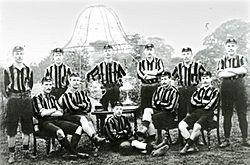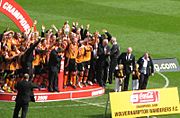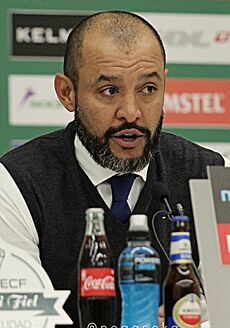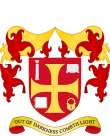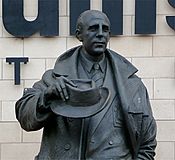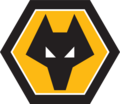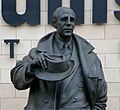Wolverhampton Wanderers F.C. facts for kids
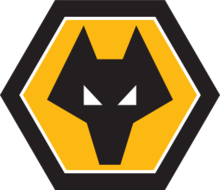 |
||
| Full name | Wolverhampton Wanderers Football Club | |
|---|---|---|
| Nickname(s) | Wolves, the Old Gold | |
| Founded | 1877, as St. Luke's F.C. | |
| Ground | Molineux Stadium | |
| Capacity | 31,750 | |
| Owner | Fosun International | |
| Chairman | Jeff Shi | |
| Head coach | Vítor Pereira | |
| League | Premier League | |
| 2018–19 | Premier League, 7th of 20 | |
|
|
||
Wolverhampton Wanderers Football Club, often called Wolves, is a professional football team. They are based in Wolverhampton, England. The club plays in the Premier League, which is the top football league in England.
Wolves have played at Molineux Stadium since 1889. Their traditional uniform is old gold shirts and socks with black shorts. Since 1979, their uniform has also featured a "wolf's head" logo. Wolves have strong rivalries with other teams from the West Midlands. Their biggest rivalry is the Black Country derby against West Bromwich Albion. Since 2016, a Chinese company called Fosun International has owned the club.
The club started as St. Luke's F.C. in 1877. They changed their name to Wolverhampton Wanderers two years later. In 1888, they became one of the first teams to join the Football League. Wolves won the FA Cup for the first time in 1893. They won it again in 1908 while in the Second Division.
The team won the English League championship three times. These wins were in 1953–54, 1957–58, and 1958–59. All these victories happened when Stan Cullis was their manager. Wolves also won two more FA Cups in 1949 and 1960. They won the League Cup in 1974 and 1980.
In the early 1980s, Wolves faced money problems. They were almost shut down in 1982. The club dropped down to the Fourth Division, the lowest tier, for the first time. However, they quickly recovered. They won the Fourth Division and the Football League Trophy in 1987–88. They then won the Third Division title in 1988–89.
After many years in the second tier, Wolves reached the Premier League in 2003. They were relegated after one season. They returned to the Premier League in 2008–09. After more ups and downs, including dropping to League One, Wolves returned to the Premier League in 2018. They won the League One title in 2013–14 and the Championship title in 2017–18.
Wolves were one of the first British clubs to install floodlights in 1953. They played special "floodlit friendlies" against top teams from other countries. These games helped inspire the creation of the European Cup (now the UEFA Champions League) in 1955. Wolves reached the quarter-finals of the European Cup in 1959–60. They also reached the semi-finals of the European Cup Winners' Cup in 1960–61. In 1972, they made it to the final of the first-ever UEFA Cup. After a long break, they reached the UEFA Europa League quarter-finals again in 2020.
Contents
- Club History
- How Wolves Started and Joined the Football League (1877–1893)
- FA Cup Wins and War Years (1893–1950)
- The Stan Cullis Golden Era (1950–1960)
- Cup Success in the 1960s and 1970s (1960–1980)
- Money Problems and Comeback (1980–1990)
- The Hayward Years (1990–2007)
- Promotions, Relegations, and Changes (2007–2016)
- Fosun Era: Back to the Premier League and Europe (2016–Present)
- Team Colors and Badge
- The Stadium: Molineux
- Players
- Player of the Year Awards
- Club Staff
- Famous Players and Managers
- Fan Support
- Club Ownership and Money
- Club Achievements
- Records and Statistics
- League History Overview
- Images for kids
- See also
Club History
How Wolves Started and Joined the Football League (1877–1893)
Wolves have a very important place in English football history. The club began in 1877 as St. Luke's F.C.. It was started by two school friends, John Baynton and John Brodie. Their headmaster gave them a football.
The team played its first game on January 13, 1877. In August 1879, they joined with a local cricket club's football section. This created Wolverhampton Wanderers. They moved to a better field on Dudley Road in 1881. In 1884, they won their first trophy, the Wrekin Cup.
Wolves became a professional team. In 1888, they were chosen as one of the twelve founding members of the Football League. They played in the very first Football League games on September 8, 1888. They finished third in their first season. They also reached their first FA Cup Final in 1889, but lost. After that season, the club moved to Molineux, which was a pleasure park at the time.
FA Cup Wins and War Years (1893–1950)
Wolves won the FA Cup for the first time in 1893, beating Everton 1–0. They reached another FA Cup Final in 1896. In 1908, they won their second FA Cup, beating Newcastle United 3–1. This was two years after they had dropped into the Second Division.
After World War I, the club struggled to get back to the top division. They reached another FA Cup Final in 1921. In 1923, they were relegated to the Third Division (North). But they won that division in their first try. Eight years later, in 1931–32, Wolves returned to the top league as Second Division Champions. This was after 26 years away.
Under manager Major Frank Buckley, the team became one of England's best before World War II. They finished second in the league twice in a row (1937–38 & 1938–39). They also reached the last FA Cup Final before the war in 1939, losing to Portsmouth. In 1937–38, Wolves almost won their first English league title. They needed a win in their last game but lost 0–1.
After World War II, league football started again. Wolves again missed out on the First Division title on the last day. A loss to Liverpool meant Liverpool became champions. This was the last game for Stan Cullis as a player. A year later, he became the club's manager. In his first season, Cullis led Wolves to their first major trophy in 41 years. They beat Leicester City to win the FA Cup in 1949.
The Stan Cullis Golden Era (1950–1960)
The 1950s were the most successful time in Wolves' history. Led by captain Billy Wright, Wolves won the league championship for the first time in 1953–54. They beat out local rivals West Bromwich Albion. They won two more titles in 1957–58 and 1958–59. Wolves were seen as one of the best teams in English football.
Wolves were famous for their success and for playing special "floodlit friendlies." These were games against top teams from around the world. Wolves were one of the first British clubs to get floodlights in 1953. One very famous friendly saw Wolves beat Honvéd, a team with many players from the strong Hungarian national team. This led the media to call Wolves "Champions of the World." This game helped inspire the idea for the European Cup. Wolves were one of the first British clubs to play in it. In 1957–58, Wolves even beat Real Madrid in two friendly matches.
Cup Success in the 1960s and 1970s (1960–1980)

The 1960s started well with a fourth FA Cup win in 1960. Wolves almost won both the League and FA Cup that year, but finished second in the league. However, the team started to decline. Manager Stan Cullis was let go in September 1964 after 16 years. Wolves were relegated in 1965, their first time out of the top division since 1932. But they were promoted back in 1967.
In 1967, Wolves played a mini-season in North America as the "Los Angeles Wolves". They won their division and the championship.
Back in the English top league, Wolves had more success under manager Bill McGarry. They finished fourth in the league in 1971. This qualified them for the new UEFA Cup. They reached the UEFA Cup final in 1972, beating teams like Juventus. They lost to Tottenham Hotspur 3–2 overall. Two years later, Wolves won the League Cup for the first time, beating Manchester City 2–1 in the final.
They were relegated again in 1976. But Wolves bounced back right away, winning the Second Division in 1976–77. In 1980, they won the League Cup again. Andy Gray scored the winning goal against Nottingham Forest.
Money Problems and Comeback (1980–1990)
Building a new stand at Molineux in 1979 cost a lot of money. This led to huge financial problems for the club in the 1980s. Fewer fans came to games, partly because of a tough economy. Wolves couldn't pay back their loans and faced serious trouble in 1982.
The club was almost shut down. But a group led by former player Derek Dougan bought the club. This helped them get promoted back to the First Division in 1982–83. However, the new owners didn't invest enough. The team then suffered three relegations in a row.
In 1986, the club was in trouble again. The Wolverhampton City Council bought the stadium and land. A local developer paid off the club's debts. This allowed the club to survive. In the 1986–87 season, Wolves played in the Fourth Division for the first time. With new manager Graham Turner and goals from Steve Bull, they reached the play-off final.
The team then won the Fourth Division and the Football League Trophy in 1987–88. They followed this by winning the Third Division title in 1988–89.
The Hayward Years (1990–2007)
A lifelong fan, Jack Hayward, bought the club in 1990. He immediately paid for a big renovation of Molineux. It became a modern stadium with seats for everyone. After the stadium was finished in 1993, Hayward spent money on players. He wanted to get the team promoted to the new Premier League.
Despite spending a lot, managers Graham Taylor and Mark McGhee couldn't achieve this. They lost in the play-offs in 1995 and 1997. Finally, in 2003, Wolves were promoted. They beat Sheffield United 3–0 in the play-off final. This ended their 19-year absence from the top league. However, they were relegated back to the EFL Championship after just one season.
Promotions, Relegations, and Changes (2007–2016)
After Glenn Hoddle couldn't get them back to the Premier League quickly, Mick McCarthy rebuilt the team. They unexpectedly reached the play-offs in 2007. Steve Morgan bought the club from Sir Jack Hayward in 2007. Two years later, the team returned to the Premier League as champions of the EFL Championship.
Wolves managed to avoid relegation for two seasons. But McCarthy was dismissed in the 2011–12 season. His assistant, Terry Connor, took over, but the team was relegated. They were then relegated again to EFL League One in 2012–13. This was a level the club hadn't played at since 1989.
Kenny Jackett became the new head coach in May 2013. He led the team back to the EFL Championship in his first season. They set a new club record with 103 points. This is also the most points ever by a team in the third tier.
Fosun Era: Back to the Premier League and Europe (2016–Present)
On July 21, 2016, Chinese company Fosun International bought the club for about £45 million. The new owners hired Walter Zenga as head coach, but he was replaced by Paul Lambert after only 14 games. Lambert was also dismissed. Then, former FC Porto boss Nuno Espírito Santo took over. Under Nuno, Wolves won the EFL Championship title in 2017–18. They returned to the Premier League after six years.
Wolverhampton Wanderers finished 7th in their first season back in the Premier League (2018–19). This was their highest finish since 1979–80. It earned them a spot in the UEFA Europa League qualification rounds. This was their first time in a European competition since 1980–81. They lost to Sevilla 1–0 in the quarter-finals in 2020. Wolves finished 7th again in the Premier League in 2019–20.
In the 2020–21 season, striker Raúl Jiménez suffered a serious injury. The team struggled to score goals and finished 13th. Nuno Espírito Santo left, and Bruno Lage became manager. In 2021–22, the club finished 10th. Lage was dismissed in October 2022. Former Real Madrid and Spain manager Julen Lopetegui replaced him. Lopetegui guided Wolves to a 13th-place finish. He left before the 2023–24 season due to disagreements about money for new players. Gary O'Neil replaced him. O'Neil was sacked in December 2024, and Vítor Pereira became the new manager.
Team Colors and Badge
|
|
| Original colours. |
The club's traditional colors are gold and black. These colors represent the city council's motto: "out of darkness cometh light." Gold stands for light, and black for darkness. The team's first colors were red and white, from their school. But for most of their history, their home uniform has been old gold shirts with black shorts.
In the early years, the shirts had different designs, like stripes. But since the 1930s, they have mostly used a plain shirt design. Before the 1960s, they used a darker gold color called "old gold".
Like most English teams, their early shirts only had a badge for special games, like cup finals. The first badge on Wolves shirts was the coat of arms of Wolverhampton. In the late 1960s, Wolves started using their own club badge. It showed a single leaping wolf. In the mid-1970s, it changed to three leaping wolves. Since 1979, the badge has been a single "wolf head" design. The current badge was last updated in 2002.
Wolves' traditional away colors have been all-white. But in recent years, they have used other colors like black, blue, and purple.
Kit Makers and Sponsors
| Period | Kit manufacturer | Shirt sponsor (centre) | Shirt sponsor (sleeve) |
|---|---|---|---|
| 1974–1982 | Umbro | No sponsor | No sponsor |
| 1982–1985 | Tatung | ||
| 1985–1986 | No sponsor | ||
| 1986 | Benjamin Perry | ||
| 1986–1988 | Spall | Staw | |
| 1988–1990 | Scoreline | Manders Paint & Ink | |
| 1990 | Goodyear | ||
| 1990–1992 | Bukta | ||
| 1992–1994 | Molineux | ||
| 1994–1996 | Nutmeg | ||
| 1996–2000 | Puma | ||
| 2000–2002 | Wolves Leisure | ||
| 2002–2004 | Admiral | Doritos | |
| 2004–2009 | Le Coq Sportif | Chaucer Consulting | |
| 2009–2010 | Sportingbet | ||
| 2010–2013 | Burrda | ||
| 2013–2015 | Puma | WhatHouse? | |
| 2015–2016 | Silverbug | ||
| 2016–2018 | The Money Shop | ||
| 2018–2019 | Adidas | W88 | CoinDeal |
| 2019–2020 | ManBetX | ||
| 2020–2021 | Aeroset | ||
| 2021–2022 | Castore | Bitci.com | |
| 2022–2023 | AstroPay | 12BET | |
| 2023–2024 | 6686 Sports | ||
| 2024– | Sudu | DEBET | JD Sports |
The Stadium: Molineux
Old Stadiums
When the club first started, they played on a field on Goldthorn Hill. It could hold about 2,000 fans. In 1879, they moved to John Harper's Field. Two years later, they moved to Dudley Road. This is where they played their first FA Cup game in 1883. The Dudley Road ground could eventually hold 10,000 people.
Molineux Stadium Today
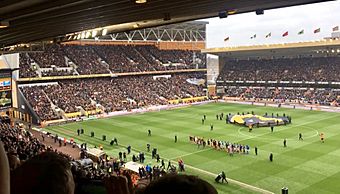
Molineux Stadium, Wolverhampton, 2018
|
|
| Capacity | 31,750 |
|---|---|
| Construction | |
| Renovated | 1924–34; 1978–79; 1991–93 |
| Expanded | 2011–12 |
| Architect | Alan Cotterell (Billy Wright & Sir Jack Hayward stands) AFL (Stan Cullis stand) Atherden & Rutter (Steve Bull stand) |
| Main contractors | Alfred McAlpine (3 stands) Buckingham Group (Stan Cullis stand) |
| Tenants | |
| Wolverhampton Wanderers F.C. (1889–present) | |
In the summer of 1889, the club moved to its current home, Molineux. The stadium is named after the Molineux House, built in the 1700s. The grounds of the house later became a public park. When a company bought these grounds in 1889, they rented them to Wolves. The first official game at Molineux was on September 7, 1889. About 4,000 fans watched. The ground could hold 20,000 people.
Wolves bought the land in 1923. They started making improvements, building new stands. By 1934, the stadium had four complete stands. The South Bank was one of the largest standing areas in the country. It often held over 30,000 fans.
Before seating rules, the stadium could hold over 60,000 spectators. The record attendance was 61,315 for a game against Liverpool in 1939. In the 1940s and 1950s, average attendance was often over 40,000. This was when the club was at its best. Molineux was one of the first British grounds to get floodlights. This allowed them to host special midweek games against teams from around the world. These games were very important and attracted huge crowds. The BBC often showed them on TV.
In 1979, a new all-seater stand, the John Ireland Stand, was built. This was the first step in rebuilding the whole stadium. But the cost of this stand caused the club to have serious money problems. By 1986, only the John Ireland Stand and the South Bank terrace were still in use. New safety laws meant the other old stands had to close. The club didn't have money to rebuild them.
After Sir Jack Hayward bought the club in 1990, he spent £8.5 million to rebuild Molineux. Between 1991 and 1993, three sides of the stadium were completely rebuilt. It became a 28,525-seat stadium. The new stands were named after famous Wolves figures like Billy Wright and Stan Cullis. This stadium design lasted for almost 20 years.
In 2010, plans were made to make the stadium bigger. The first part of this plan was a new Stan Cullis Stand. It opened for the 2012–13 season. This raised the stadium's capacity to 31,700. There were plans to rebuild the Steve Bull Stand to reach about 36,000 seats. But these plans were put on hold when the club was relegated from the Premier League in 2012.
After Fosun bought the club in 2016, stadium plans were discussed again. In 2019, they considered rebuilding the Steve Bull Stand and the Sir Jack Hayward Stand. This would increase capacity to 45,000–46,000. However, in 2020, the club announced more gradual improvements. They want to keep the stadium's unique feel and focus on investing in the team.
Players
First-Team Squad
|
|
Players on Loan
|
Youth Teams and Academy
The Wolverhampton Wanderers Under-23s team plays in Premier League 2. This league is for players aged 23 and younger. However, three older players can also play. Their home games are usually at Kidderminster Harriers' Aggborough.
Wolves Women's Team
The Wolves Women team started in 1975. In 2008, they became the club's official women's team. They currently play in the FA Women's National League North, which is the third level of English women's football. Their home games are played in Telford.
Player of the Year Awards
|
|
|
Club Staff
- Football Staff
- Manager:
 Vítor Pereira
Vítor Pereira - Assistant manager:
 Luís Miguel
Luís Miguel - First-team coach:
 André Monteiro,
André Monteiro,  Edgar Sá
Edgar Sá - Head of goalkeeping:
 Ricardo Silva
Ricardo Silva - Conditioning coach:
 António Ascensão
António Ascensão - Under-23 head coach:
 James Collins
James Collins
- Medical Staff
- Club doctor:
 Kai Win
Kai Win - First-team physiotherapist:
 Ollie Leaper
Ollie Leaper - First-team sports therapist:
 Gregg Jones
Gregg Jones - First-team therapist:
 Rui Fuste
Rui Fuste - Soft-tissue therapist:
 Matt Butterfield
Matt Butterfield
|
Famous Players and Managers
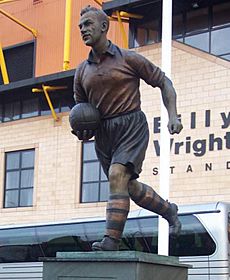
Notable Players
For details on all former players, see List of Wolverhampton Wanderers F.C. players
Many famous players have played for Wolves over the years. One of the most famous is Billy Wright. He was captain of England a record 90 times. He was the first player to play 100 international games. He also won the Footballer of the Year Award in 1952. Another Wolves player, Bill Slater, won this award in 1960.
In total, 36 players have played for England while at Wolves. This includes the club's record goalscorer, Steve Bull.
The Wolverhampton Wanderers Hall of Fame includes these former players:
 Mike Bailey
Mike Bailey Peter Broadbent
Peter Broadbent Steve Bull
Steve Bull Stan Cullis
Stan Cullis Derek Dougan
Derek Dougan Malcolm Finlayson
Malcolm Finlayson Ron Flowers
Ron Flowers Johnny Hancocks
Johnny Hancocks Billy Harrison
Billy Harrison Kenny Hibbitt
Kenny Hibbitt Jackery Jones
Jackery Jones John McAlle
John McAlle Jimmy Mullen
Jimmy Mullen Andy Mutch
Andy Mutch Derek Parkin
Derek Parkin John Richards
John Richards Bill Slater
Bill Slater Roy Swinbourne
Roy Swinbourne Andy Thompson
Andy Thompson Dave Wagstaffe
Dave Wagstaffe Bert Williams
Bert Williams Billy Wright
Billy Wright
Manager History
Wolves have had 32 different permanent managers. The first manager was called "club secretary" until 1922.
The most successful manager was Stan Cullis. He managed for 16 years. During his time, Wolves won all three of their league championships and two FA Cups. Two other managers are in the Club Hall of Fame: Major Frank Buckley and Graham Turner. Turner led the team to win two league titles in a row in the late 1980s. Bill McGarry and John Barnwell both won the League Cup for Wolves in the 1970s and 1980s.
In the 21st century, Dave Jones, Mick McCarthy, and Nuno Espírito Santo have led the club to the Premier League. Kenny Jackett led Wolves to a record 103 points in EFL League One in 2013–14.
Ståle Solbakken was Wolves' first foreign manager. Later, Walter Zenga, Nuno Espírito Santo, Bruno Lage, and Julen Lopetegui also managed the team. Wolves have also been managed by two former England national team managers: Graham Taylor and Glenn Hoddle.
Fan Support
Wolves have many fan clubs in the UK and around the world. There are fan clubs in Australia, the United States, Sweden, and Norway, among others. They have a large fan base in Scandinavia. This is because TV in that area showed football from the Midlands in the 1970s. Wolves were a top team then.
Rivalries
Wolves' oldest and strongest rivalry is with West Bromwich Albion. Their games are called the Black Country derby. The two clubs are about eleven miles apart. They have played each other 163 times. Their first game was an FA Cup match in 1886. A survey found this to be the strongest rivalry in English football. Both clubs were founding members of the Football League. They even competed for the league title in 1953–54, with Wolves winning.
Wolves also have rivalries with two clubs from Birmingham: Aston Villa and Birmingham City. Wolves' closest team geographically is Walsall. But they rarely play at the same level, so this rivalry is less important. Since Wolverhampton was historically in Staffordshire, a Staffordshire derby between Wolves and Stoke City is also recognized.
In the 2018–19 Premier League season, Wolves were the only team from the West Midlands in the top league. In the 2020–21 season, Wolves played both Aston Villa and West Bromwich Albion. Since Albion was relegated, Aston Villa has been Wolves' only West Midlands rival in the Premier League.
Fan Culture
In the 1950s, when the club was at its peak, fans sang "The Happy Wanderer". More recently, "Hi Ho Silver Lining" has become a popular song at home games. Fans change the chorus to "Hi Ho Wolverhampton!" The song "The Liquidator" was also popular. However, the police asked the club to stop playing it due to some fans using inappropriate lyrics.
The club has a Fans' Parliament. Here, fans meet with club officials to discuss issues. There was also a fan magazine called "A Load of Bull" (ALOB). It was named after the famous goalscorer Steve Bull. It shared fans' opinions from 1989 to 2012.
Club Ownership and Money
The club is owned by the Chinese company Fosun International. They bought the club on July 21, 2016, for about £45 million. They bought it from the previous owner, Steve Morgan.
Like most football clubs, Wolves earn a lot of money from shirt sponsorship deals. Past shirt sponsors include Tatung, Goodyear, Doritos, Sportingbet, and The Money Shop.
Fosun bought Wolves from Steve Morgan. He had bought the club in August 2007 for a very small amount of money. He agreed to invest £30 million into the club. Morgan owned the club for nine seasons. He put the club up for sale in September 2015. Morgan had bought the club from Sir Jack Hayward. Sir Jack was a lifelong fan who bought the club in 1990 for £2.1 million. During his time, Sir Jack invested about £50 million of his own money. He rebuilt the stadium and bought new players. But the team only played one season in the top league during his 17 years.
Sir Jack's takeover greatly improved the club's money situation. This was after a difficult 1980s when the club almost went bankrupt twice. In 1982, the club was saved from closing down. Two Saudi brothers bought it. However, they didn't invest enough. The club faced more financial problems and was relegated several times. In 1986, the Wolverhampton City Council bought the stadium for £1.12 million. A local developer helped pay off the club's debts. This allowed the club to survive.
Club Achievements
Wolves are fourth in the all-time table for points in all divisions since 1888. Only Manchester United, Liverpool, and Arsenal have more points. Wolves were the first team to win all four divisions of English professional football. They have won every major competition in English domestic football.
League Titles
- First Division (top league)
- Champions: 1953–54, 1957–58, 1958–59
- Second Division / Championship (second league)
- Champions: 1931–32, 1976–77, 2008–09, 2017–18
- Play-off winners: 2003
- Third Division North / League One (third league)
- Champions: 1923–24, 1988–89, 2013–14
- Fourth Division (fourth league)
- Champions: 1987–88
Cup Wins
- FA Cup
- Winners: 1892–93, 1907–08, 1948–49, 1959–60
- Football League Cup
- Winners: 1973–74, 1979–80
- FA Charity Shield
- Winners: 1949*, 1954*, 1959, 1960* (* shared)
- Associate Members' Cup
- Winners: 1987–88
- Football League War Cup
- Winners: 1942
- Texaco Cup
- Winners: 1970–71
Records and Statistics
Player Records
Derek Parkin has played the most first-team games, with 609 appearances. The highest goalscorer is Steve Bull with 306 goals. Billy Wright played for England 105 times while at Wolves, more than any other Wolves player. Matheus Nunes was Wolves' most expensive signing at £38 million in 2022. He was then sold for £53 million in 2023, making him Wolves' record transfer sale.
Team Records
- Biggest win: 14–0 vs Crosswell's Brewery, FA Cup, November 13, 1886
- Biggest defeat: 1–10 vs Newton Heath, Division 1, October 15, 1892
- Most league goals in a season: 115 (Division 2; 1931–32)
- Highest home attendance: 61,315 vs Liverpool, FA Cup, February 11, 1939
League History Overview
Wolverhampton Wanderers was a founding member of the Football League in 1888. The 2024–25 season is Wolves' 126th in the Football League system. Wolves have spent 119 of their 125 completed seasons in the top two leagues of English football. They have played in the third league four times, each time for only one season. Three of these seasons ended with promotion back to the second league as champions. The club has played two seasons in England's fourth league (in the 1980s).
|
|
|
|
|
|
Images for kids
See also
 In Spanish: Wolverhampton Wanderers Football Club para niños
In Spanish: Wolverhampton Wanderers Football Club para niños
 | Tommie Smith |
 | Simone Manuel |
 | Shani Davis |
 | Simone Biles |
 | Alice Coachman |


